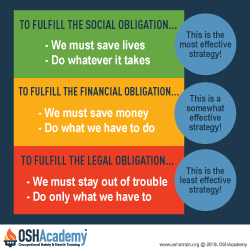6. Determine Motivation
What motivates employers: Have you ever wondered what motivates employers to approve safety recommendations.
Before presenting recommendations, think about what objections and motivations the decision-maker might have. Be sure to include counter-arguments to objections by addressing the three employer "obligations" where they most logically apply.
As discussed in OSHAcademy Course 700, employers are motivated to approve your recommendation primarily to meet one of the following safety obligations:
The Legal Obligation: This describes the employer's legal duty to comply with occupational safety and health standards. When this is the employer's primary motivation, safety is considered just another cost of doing business (CODB) that may drain the corporate budget. Unfortunately, the employer will do only what is required by law and not much more. The employer's primary goals to meet this obligation are to:
- Comply with OSHA standards
- To "stay out of trouble" with OSHA
- Avoid OSHA penalties
If your employer is "doing safety" primarily to meet legal requirements, and nothing more, you'll need to emphasize OSHA requirements and benefits of compliance to overcome objections.
The Fiscal Obligation: The employer feels obligated to corporate stakeholders to operate the business in a financially prudent manner. In the private sector, this means operating at a profit. In the public sector, this means operating within a budget.
Research indicates most employers are motivated primarily by the need to fulfill their fiscal responsibilities, so don't be surprised if management asks you for a cost/benefit analysis.
The Social Obligation: In the best-case situation, the employer feels a strong obligation to each employee, the community, and society in general to support and protect the welfare of all employees: its "corporate family." Safety is not just a priority: it's perceived as a core corporate value, not open to negotiation.
If the employer makes a commitment to safety primarily to fulfill the social obligation, management is more likely to approve your recommendation no matter what the investment might be.
Knowledge Check Choose the best answer for the question.
7-7. When presenting your recommendations to a decision-maker, what should you know about this person?
You forgot to answer the question!

